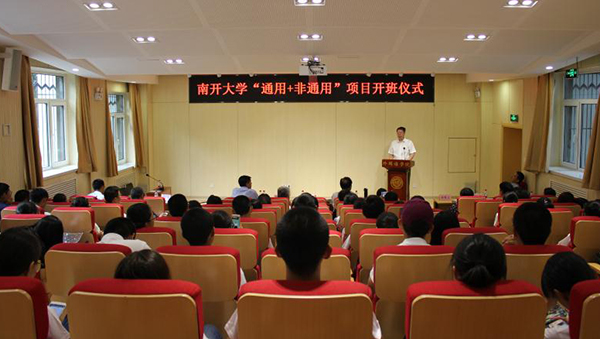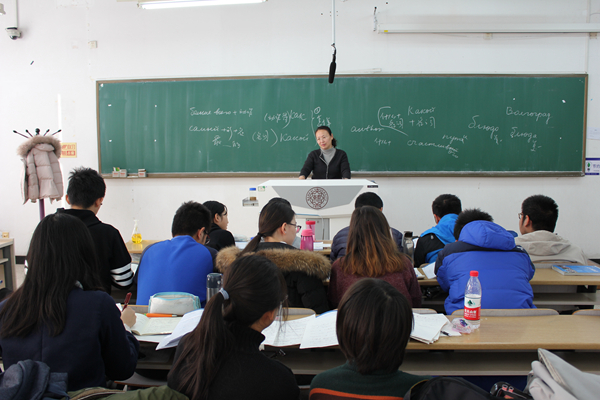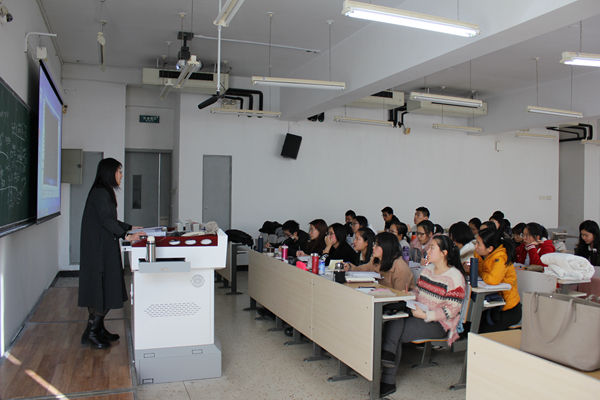
In September, 2017, freshman has just entered NKU. A parents meeting is being held in the College of Foreign Languages. When Dean Yan Guodong introduced to parents the new General + non-General talents training program of Nankai University, he had to interrupt his speech due to the spontaneous applaud from the parents. They came to consult the project information after the meeting one after another. Parents' approval made Yan Guodong fully confident in the universal + non-universal project.
Recently, the Central Committee of the People's Republic of China and the State Council issued and printed Several Opinions on Strengthening and Improving Humanities Exchanges between China and Foreign Countries. The new situation in the new era has set new and higher requirements for personnel training in colleges and universities. One Belt and One Road initiative and building a community of human destiny, all of these hot spots need to be promoted by the cultivation of compound talents with international perspectives. At present, there is a problem that talents are not compound enough in higher education cultivation mode. Either foreign language students lack other disciplinary backgrounds, or other subject students are not equipped with enough foreign language skills.
To this end, Nankai University, based on the needs of the national strategy, explore a new way to cultivate international complex high-end talents , through reforming teaching and personnel raining mode. based on the original in addition to double degree study, College set up the Humanities and Social Sciences + Foreign Language Major to cultivate talents with foreign languages skills and humanities and social sciences background (also known as General + Non-General Undergraduate Talents Training Project ), which will be implemented in 2017 freshman in September this year.

At present, the General + Non-General project involves four colleges: College of Foreign Languages, College of History, College of Tourism and Services and College of Economics. It covers seven majors, namely World History, Tourism Management and International Business, which are three general majors and four non-general majors: German, French, Japanese and Russian. After entering the school, the seven freshmen may voluntarily enroll in the General + Non-General Program at their respective colleges. After they passed the selection examination, the three General major undergraduates choose German, French, Japanese or Russian as the second major and Four non-general major undergraduates chose World History, Tourism Management or International Business respectively as their second major.
The project is a four-year academic program. Those who pass the exam will receive a bachelor's degree in foreign language and a bachelor's degree in humanities and social sciences. Unlike other minor or double degree training programs, the General + non-General project is not just a humanities and social science major with a random foreign language major which they are have only superficial knowledge. The student training program is listed separately, with wishes of students as major concern, and could be modestly adjusted, forming 12 kinds of double degree training program. The General + non-General students do not study together with other normal enrolled undergraduate students, but have an independent class system. They mainly study in College of Foreign Languages in first and second grade and, third and fourth grade in relevant humanities and social sciences colleges to have professional courses. In four years, students of General + Non-General programs should complete 180 credits to achieve full coverage of the two required courses. Graduates should write two papers in order to graduate. If students find themselves lack of academic abilities during their studies, they are offered the choice to return to the original professional learning.

At present, the first batch of 61 General + Non-general students have been studying for nearly one semester. They felt the hotness of this project at the very beginning of registration: 77 freshmen of the College of Foreign Languages enrolled and 29 were accepted, accounting for 37% of the total. 47 freshmen of the College of Tourism enrolled and, 17 were accepted, accounting for 36% of the total. Jin Yidan, a 2017 undergraduate student at College of Tourism, was admitted to the class of Tourism Management + German. She said that the students who choose General + Non-general normally have a difficult time as if they were having the second third year in high school. For example, she rushed to the classroom one hour before class each day for self-study, she and roommates will spontaneously practice a foreign language and recite words in the dorm if there is no class at night.
Liu Yong, a teacher at the Department of Russian Major, believes that general + non-general combines language tools with professional disciplines and solves the problem of students' confusion in the future planning. According to her, students who choose Russian as first majors are often not many, but students who choice general + non-general” behave more attentively and raise more questions after class. A normal Russian major class can learn a textbook in a semester, and general + non-general class can learn one and a half, with learning progress faster than nearly half than the normal class.
Duan Wenbin, deputy director of the Leading Group Office of Teaching Reform in Nankai University, said that “general + non-general is a supply-side reform of talent cultivation in Nankai and will be conducive to solving the structural contradiction between supply and demand of talents. By cultivating internationalized compound talents, students' overall competitiveness will be enhanced, and they are provide with more room and conditions to develop and serve the country's economic and social development.

University has the plan that to 2018, in addition to the existing foreign language majors, Spain, Portuguese, Italian and other languages will be fully involved in the project, while a number of humanities and social sciences will also join.
General + non-general is a microcosm of Nankai University’s teaching reform and personnel training mode reform. Recent years, Nankai University has been closely linked to the basic mission of cultivate talents and prize virtue, with the concept of public ability quality education as center, insists on giving priority to teaching, emphasizes laying a solid foundation, strengthening basic quality training, emphasizing practical education and innovation ability development, and improve the teaching quality assurance system, teaching evaluation system step by step. At present, Nankai University piloted a new teaching model of big class teaching and small class discussion in 11 courses of College English, Digital Electronic Technology, Organic Chemistry and Modern Chinese Literature. It is also actively promoting the teaching reform of enrolling large classes and cultivating large classes, formulating the Regulations on Basic Workload of Undergraduate Courses for Nankai University (Trial), integrating teaching indicators into the evaluation and performance appraisal of teachers.
Teaching is the foundation of educating college students and the key element of a world top-class university. The purpose of education is not only to 'fill up the bucket of water' but to 'light the fire' to ignite students' desire for learning and remodeling motivation mechanism of student learning, fostering students' innovative spirit and the motivation and ability of finding the problems Gong Ke, headmaster of Nankai University’s expectation towards the teaching reform is being realized.



